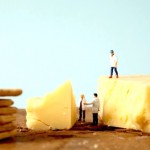Does the Buddha Drink Bubble Tea?
This week’s topic makes me think of a bubble tea shop in my hometown Nanjing. Bubble tea, first introduced in Taiwan in the 1980s, has become one of the most popular types of drinks in Asia. During the past few years, China has witnessed great prosperity in bubble tea industry: the bubble tea shop enjoys the same status as the café in the UK. In order to catch up with the newly emerged but also competitive bubble tea industry and make a fortune from that, many investors come up with different advertising and marketing strategies to attract the crazy bubble tea lovers. Some of them open themed shops with Taiwan style or Japanese style decorations while others tend to give their products fancy names and looks.
Jiming Temple (鸡鸣寺, literally means “rooster crowing”), whose history can be dated back to 527 AD, is a renowned Buddhist temple and also one of the oldest temples in Nanjing. In 2018, the temple turned its previous vegetarian restaurant into a Buddhism temple themed bubble tea shop located right next to the temple gate, which turned out to be a great commercial success. As the shop is part of the temple complex, its interior decoration goes with the temple’s overall style. The cup and package for the drinks are also embellished with patterns and symbols from Buddhism and traditional Chinese style: lotus, Chinese seals and zodiacs. The products are named after Buddhistic concepts with great dedication. The name of the shop is “Blessing from the Jiming Temple”, and it advertised that the bubble tea sold here is no longer a cup of tea, is the spiritual and emotional connection between the prayer and the invisible world. It is interesting to see that how the traditional Buddhist temple is combined with a modern creation with the subtle link of the Chinese tea culture, and how the divine religion is falling into the secular world of commerce and consumerism. Although most people buy the tea just because it is something they can drink to kill time when waiting in the long queue to buy the admission tickets rather than the blessing it may bring, it is still a commercial success and adds to the temple’s popularity.
Contributed by WenruiLi on 03/02/2020






